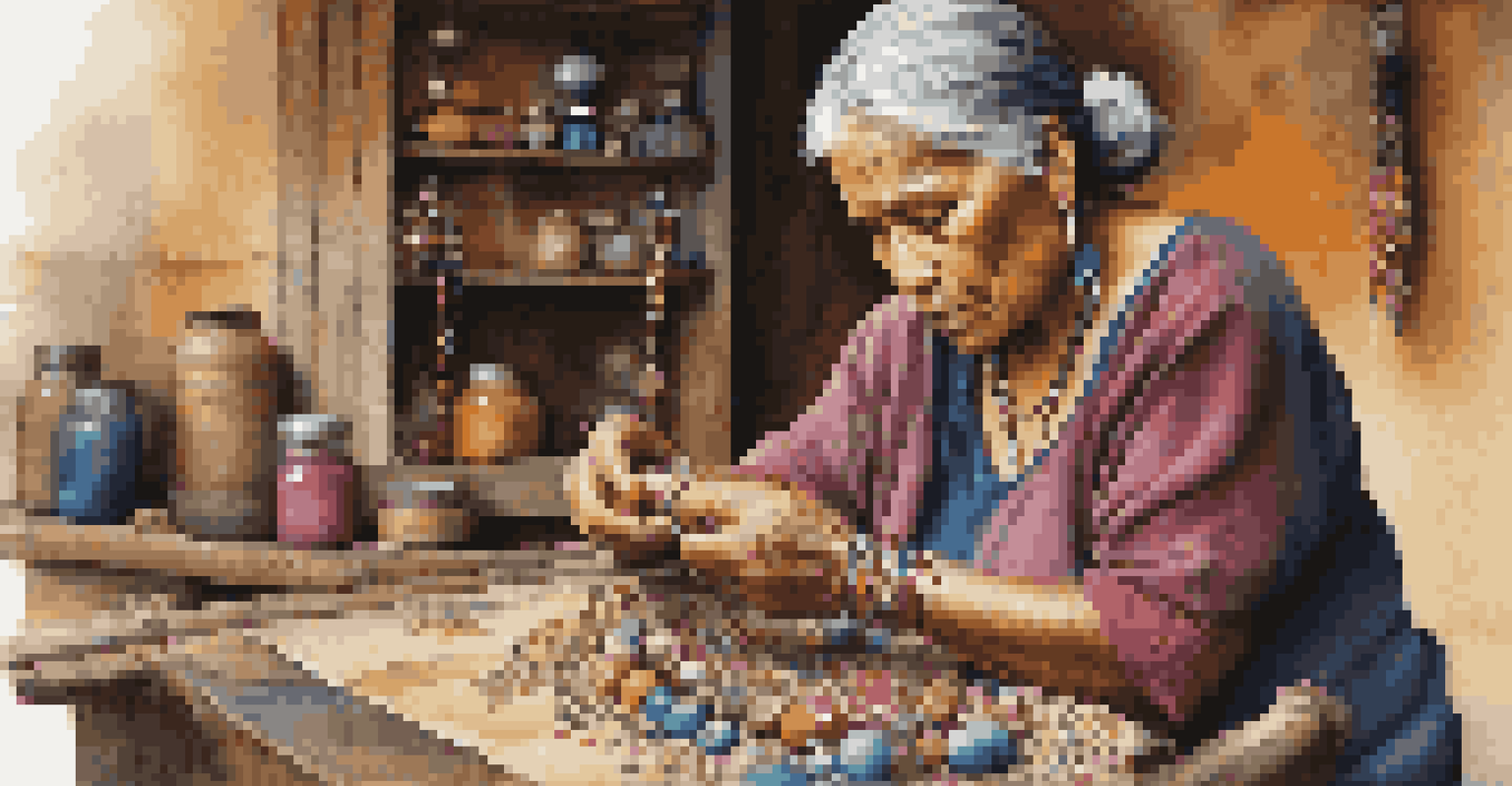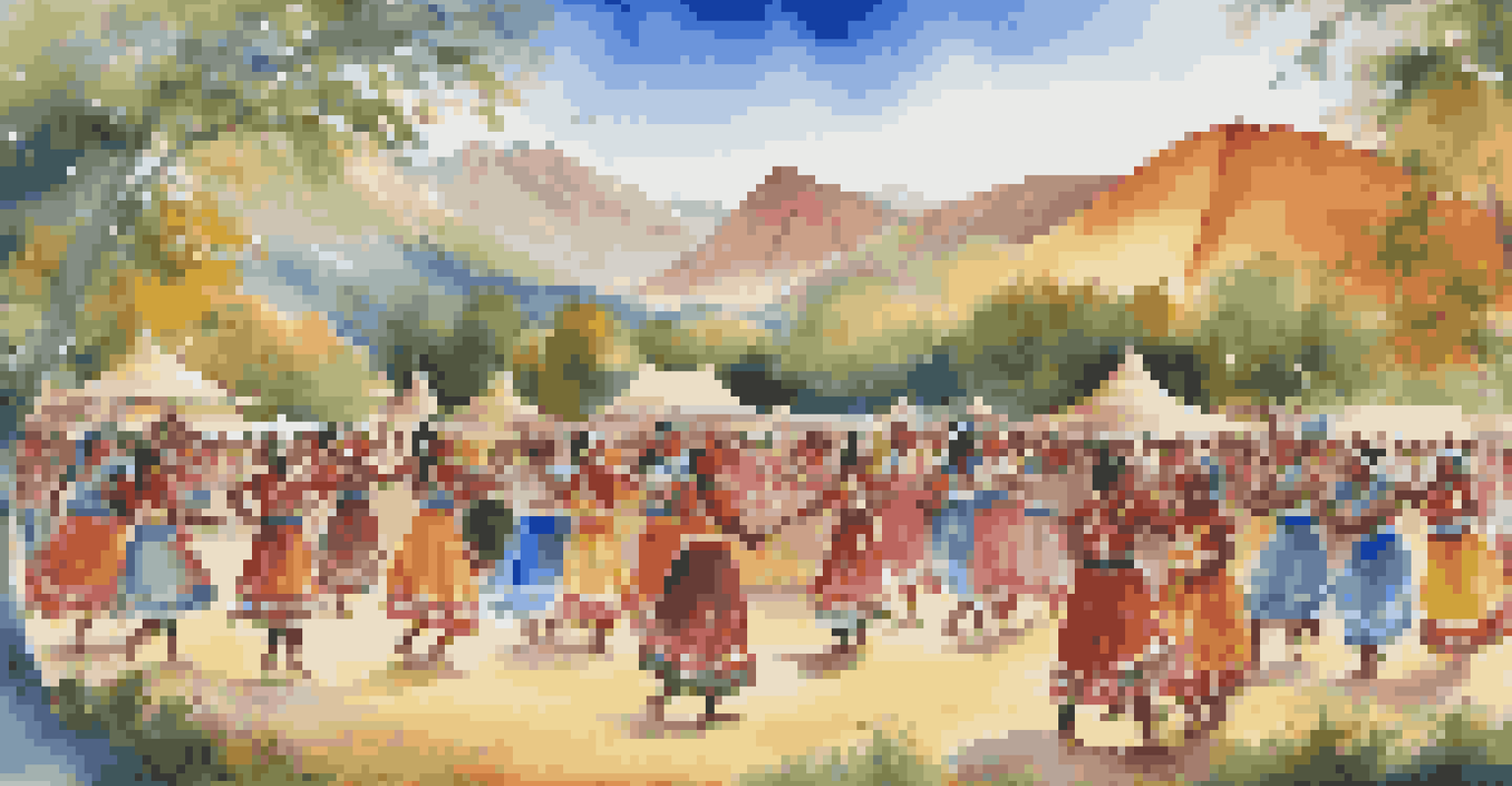How to Respect Indigenous Cultures While Traveling

Understand the History and Context of Indigenous Cultures
Before setting foot in a new destination, it's essential to learn about its Indigenous history. Each community has its unique story, shaped by centuries of traditions, struggles, and triumphs. Understanding this context can enrich your experience and help you approach interactions with respect.
The preservation of the culture, traditions, and languages of Indigenous peoples is vital to the richness of our collective humanity.
For example, when visiting a site that holds spiritual significance, recognizing its importance can deepen your appreciation. It's like visiting a friend's home; understanding their background makes your visit more meaningful. This awareness fosters respect and sensitivity to the stories behind the places you explore.
By investing time in research, you not only prepare yourself to engage respectfully but also support the preservation of these cultures. This knowledge empowers you as a traveler to be an advocate for Indigenous rights, ensuring their narratives are heard and honored.
Seek Permission and Be Mindful of Photography
When it comes to taking photos, always ask for permission first. Many Indigenous communities view photography as a form of cultural appropriation if not done respectfully. Think of it as being a guest in someone’s home; you wouldn’t snap pictures without checking if it’s okay, right?

Additionally, some sacred sites or ceremonies may have restrictions on photography. Respecting these guidelines demonstrates your understanding and appreciation of their cultural values. It’s all about honoring their space and traditions while you’re there.
Understand Indigenous History
Learning about the unique histories of Indigenous cultures enriches your travel experience and fosters respectful interactions.
Being mindful about photography also extends to sharing images online. Always credit the source and consider the implications of posting certain content. This sensitivity helps preserve the dignity of the cultures you encounter.
Support Indigenous-Owned Businesses and Initiatives
One of the most impactful ways to show respect is by supporting Indigenous-owned businesses. Whether it's staying at a local lodge, dining at a community-run restaurant, or purchasing handmade crafts, your choices can make a difference. It's a bit like choosing to shop local; your support fuels the community directly.
When we honor Indigenous cultures, we acknowledge the wisdom of the past and the power of stories to shape our future.
These businesses often provide authentic experiences that reflect the true culture of the area. By engaging with them, you gain insights that you won’t find in mainstream tourist spots. It's a win-win situation where you enjoy a genuine experience while contributing to the local economy.
Moreover, seeking out Indigenous-led tours allows you to learn directly from community members. This fosters a deeper understanding of their culture and creates a more meaningful connection during your travels.
Participate in Cultural Events with Respect
Attending Indigenous cultural events can be a wonderful way to learn and engage, but it’s crucial to do so respectfully. Make sure to research the event beforehand and understand its significance within the community. Just like attending a family gathering, knowing the customs helps you fit in and show respect.
When participating, follow guidelines and be aware of your behavior. Observing quietly and engaging when invited demonstrates your respect for the traditions being shared. This attentive approach can lead to enriching experiences and connections with community members.
Support Indigenous Businesses
Choosing to engage with Indigenous-owned businesses and initiatives helps sustain their communities and offers authentic experiences.
Remember, some events might be private or intended only for community members. Always respect these boundaries; not every celebration is open to outsiders. This respect shows that you value their culture and are not just there for entertainment.
Learn Basic Indigenous Languages and Greetings
Taking the time to learn a few basic phrases in an Indigenous language can go a long way in showing respect. It’s a small gesture that speaks volumes about your interest in their culture. Think of it as greeting someone in their native tongue; it creates an instant bond and shows you care.
Even if your pronunciation isn’t perfect, the effort will likely be appreciated. Locals often enjoy seeing visitors make an attempt, and it opens the door to deeper conversations. It’s similar to trying to speak a new language while traveling; your effort can lead to friendly exchanges.
Moreover, many Indigenous languages hold significant cultural meanings that can enhance your understanding of their worldview. By learning even a few words, you pay homage to the richness of their culture and create a more respectful interaction.
Be Aware of Cultural Appropriation
Cultural appropriation is a critical topic to understand when interacting with Indigenous cultures. It involves taking elements of a culture without understanding or respecting their significance. This can be compared to borrowing a friend’s favorite book without asking; it’s crucial to acknowledge ownership and context.
For instance, wearing traditional attire or using sacred symbols as fashion statements can be deeply hurtful. Instead, focus on appreciating these elements from a distance, recognizing their importance without claiming them as your own. It’s like admiring a beautiful painting in a gallery; you can appreciate it without taking it home.
Respect Cultural Boundaries
Being mindful of cultural appropriation and participating respectfully in events demonstrates your understanding and appreciation of Indigenous cultures.
Understanding this distinction helps you navigate your travel experiences more thoughtfully. By being mindful, you contribute to a more respectful dialogue about cultural exchange, ensuring that it’s done in a way that honors and uplifts Indigenous peoples.
Engage in Open Conversations and Listen
Creating respectful interactions often involves open conversations with Indigenous community members. Approach discussions with curiosity and a willingness to listen. Just as you would in any meaningful dialogue, being open allows for a richer exchange of ideas and perspectives.
Ask questions, but be mindful of the personal nature of some topics. Not every individual may wish to share their experiences, and respecting their boundaries is crucial. Think of it as having a deep discussion with a friend; it’s essential to gauge comfort levels.

Listening attentively not only shows respect but also provides valuable insights into their culture and experiences. By fostering genuine relationships, you can contribute to a more profound understanding and appreciation of Indigenous ways of life.
Reflect on Your Impact and Share Your Experiences
After your travels, take time to reflect on your experiences and their impact on Indigenous communities. Consider how your actions may have influenced local economies and cultural perceptions. This reflection is akin to closing a chapter in a book; it helps you internalize the lessons learned.
Sharing your experiences with others can also promote awareness and respect for Indigenous cultures. Whether through social media, blog posts, or casual conversations, your stories can inspire others to travel mindfully. It’s like planting seeds of understanding that can grow into a broader appreciation for diverse cultures.
Moreover, consider advocating for Indigenous rights and initiatives in your own community. By becoming an ally, you contribute to a larger movement that respects and uplifts Indigenous voices. This ongoing commitment helps ensure that their cultures continue to thrive and be celebrated.